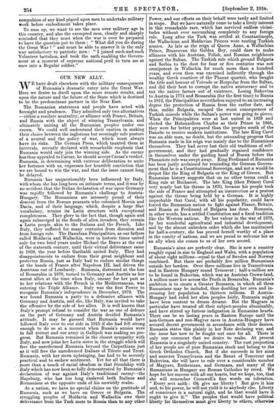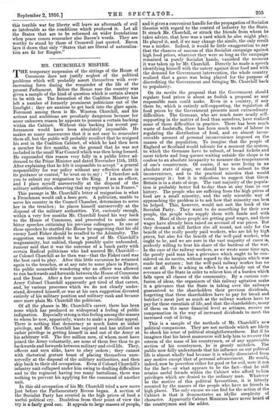OUR NEW ALLY.
WE have dealt elsewhere with the military consequences of Rumania's dramatic entry into the Great War. Here we desire to dwell upon the more remote results, and upon the nature and the future of the State which is destined to be the predominant partner in the Near East.
The Rumanian statesmen and people have acted with foresight and prudence. They admitted only two alternatives —either a resolute neutrality, or alliance with France, Britain, and Russia with the object of winning Transylvania, and ultimately uniting all the Rumanian peoples under one crown. We could well understand their caution in making their choice between the inglorious but seemingly safe posture of a neutral and the policy of war, which must always have its risks. The German Press, which taunted them at intervals, recently declared with remarkable emphasis that Rumania would only join the winning side. As the enemy has thus appealed to Caesar, he should accept Caesar's verdict. Rumania, in determining with extreme deliberation to unite her fortunes with us, expresses her heartfelt conviction that we are bound to win the war, and that the issue cannot long be delayed. Rumania has unquestionably been influenced by Italy, with whom she has long been on intimate terms, and it was by no accident that the Italian declaration of war upon Germany was rapidly followed by Rumania's challenge to Austria- Hungary. The Rumanians are intensely proud of their descent from the Roman peasants who colonized Moesia and Dacia, and of their language, which, despite a large Slav vocabulary, retains its Latin structure with exceptional completeness. They glory in the fact that, though again and again submerged in the floods of alien invaders, they remain a Latin people, akin to the Italians and the French. Like Italy, they suffered for many centuries from disunion and from foreign rule. The Danubian Principalities, as our fathers called Moldavia and Wallachia, were in historic times united only for two brief years under Michael the Brave at the end of the sixteenth century, until their virtual deliverance came in 1859, the year before Garibaldi united Italy. They had disappointments to endure from their great neighbour and protector Russia, just as Italy had to endure similar things at the hands of France after Napoleon III. had driven the Austrians out of Lombardy. Rumania, distressed at the loss of Bessarabia in 1878, turned to Germany and Austrieas her surest allies at the time when Italy, uneasy for her part as to her relations with the French in the Mediterranean, was entering the Triple Alliance. Italy was the first Power to recognize Rumania's independence in December, 1879. The war found Rumania a party to a defensive alliance with Germany and Austria, and she, like Italy, was invited to take the offensive by the side of her allies. It is well known that Italy's prompt refusal to consider the war as one of defence on the part of Germany and Austria decided Rumania's attitude. It may be guessed that Rumania would have followed Italy over to our side in 1915 if she had felt strong enough to do so at a moment when Russia's armies were in full retreat and our army in Gallipoli was making no pro- wess. But Rumania remained in the closest sympathy with Italy, and now joins her Latin sister in the struggle which will free the unredeemed Rumania beyond the Carpathians just as it will free the unredeemed Italians of Trieste and Trent. Rumania, with her stern upbringing, has had to be Severely practical and to eschew sentiment. Yet for all that there is more than a touch of racial idealism in that friendship with Italy which has now been so fully demonstrated by Rumania's declaration of war against Italy's traditional enemy—the Hapsburg, who has too long enslaved both Italians and Rumanians at the opposite ends of his unwieldy realm.
As a nation, we have no special claims on the gratitude of Rumania, such as we have on Greece or Bulgaria. The struggling peoples of Moldavia and Wallachia owe their deliverance from the Turk more to Russia than to any other Power, and our efforts on their behalf were tardy and limited in scope. But we have naturally come to take a lively interest in this remarkable race, which has survived endless vicissi- tudes without ever succumbing completely to any foreign rule. Long, after the Turk was settled at Constantinople, the Wallachian and Moldavian Princes were routing Turkish armies. As late as the reign of Queen Anne, a Wallachian Prince, Brancovan the Golden Bey, could dare to make alliances with his Austrian, Polish, and Russian neighbours against the Sultan. The Turkish rule which ground Bulgaria and Serbia to the dust for four or five centuries was not omnipotent in Wallachia for much more than a hundred years, and even then was exercised indirectly through the wealthy Greek courtiers of the Phanar quarter, who bought the title and honour of Voivode or Hospodar from the Sultan, and did their best to corrupt the native aristocracy and to tax the native farmer out of existence. Losing Bukovina to Austria in 1774 and Bessarabia (for the first time) to Russia in 1812, the Principalities nevertheless enjoyed to an increasing degree the protection of Russia from the earlier date, and thus, unlike Bulgaria, escaped the worst consequences of Turkish misrule while the Sultan's power was going to pieces. When the Principalities were at last united in 1859 and elected the Hohenzollern Charles as their Prince in 1866, they were far better prepared than the peoples south of the Danube to receive modern institutions. The late King Carol was an able man, no doubt, but the astounding progress that Rumania made in his reign was mainly due to the Rumanians themselves. They had never lost their old traditions of self- government, and they had gradually regained confidence in themselves under the guiding hand of Russia before the Phanariote rule was swept away. King Ferdinand of Rumania has been justly acclaimed for reminding the German Govern- ment that he is a Constitutional Sovereign, and not a would-be despot like the King of Bulgaria or the King of Greece. But Rumanian history suggests that on no other terms could a King rule at Bucharest. The late King (then Prince) Carol very nearly lost his throne in 1870, because his people took the side of France and attempted an insurrection as a protest against the throne being held by a German. It is highly improbable that Carol, with all his popularity, could have forced the Rumanian nation to fight against France, Britain, and Russia as Ferdinand of Bulgaria has done. Rumania, in other words, has a settled Constitution and a fixed tradition like the Western nations. By her valour in the war of 1878, by her wonderful agricultural and industrial development, and by the almost unbroken order which she has maintained for half-a-century, she has proved herself worthy of a place in the comity of nations, and we are proud to welcome her as an ally when she comes to us of her own accord.
Rumania's aims are perfectly clear. She is now a country roughly equal in size to England and Wales, with a population of about eight millions—equal to that of Sweden and Norway combined. But there are probably five million Rumanians outside her borders. Over three millions live in Transylvania and in Eastern Hungary round Temesvar ; half-a-million are to be found in Bukovina, which was an Austrian Crown-land. A million more live across the Pruth in Bessarabia. Rumania's ambition is to create a Greater Rumania, in which all these Rumanians may be included, thus doubling her area and in- creasing her population to thirteen _millions. If Austria- Hungary had ruled her alien peoples fairly, Rumania might have been content to dream dreams. But the Magyars in particular have treated all their subject-peoples abominably, and have stirred up furious indignation in Rumanian hearts. There can be no lasting peace in Eastern Europe until the non-German and non-Magyar races in Austria-Hungary have secured decent government in accordance with their desires. Rumania states this plainly in her Note declaring war, and the issue has now to be fought out once for all. There is only one comment that we desire to make. At present Rumania is a singularly united country. The vast proportion • of her people are of pure Rumanian stock and belong to the Greek Orthodox Church. But if she succeeds in her aims and annexes Transylvania and the Banat of Temesvar and Bukovina, she will have to rule over a considerable number of Magyars, Ruthenian, and Germans, and many of the Rumanians in Hungary are Roman Catholics by creed. We hope for her success with all our hearts, but we hope, too, that she will remember Cromwell's fine words on toleration. " Every sect saith : Oh give me liberty l But give it him and, to his power, he will not yield it to anybody else. Liberty of conscience is 'a natural right, and he that would have it ought to give it." The peoples that would have political liberty for themselves must give liberty to others, otherwise this terrible war for liberty will leave an aftermath of evil as intolerable as the conditions which produced. it. Let all the States that are to be reformed on wider foundations when peace comes remember also Bacon's words. They are worthy to stand by those of Cromwell just quoted. Bacon lays it down that only "States that are liberal of naturaliza- tion are fit for Empire."































 Previous page
Previous page